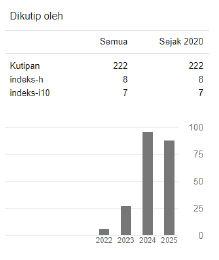Educational Human Resource Management Strategies in the Digital Era
 https://doi.org/10.54012/ijcer.v4i1.622
https://doi.org/10.54012/ijcer.v4i1.622
 Abstract views: 332
Abstract views: 332
 PDF downloads: 290
PDF downloads: 290
Keywords:
Digital Transformation, Educational Human Resource, Management, Global Strategies, Educational Technology, InnovationAbstract
Digital transformation drove significant changes in various aspects of educational governance, including in the management of human resources (HR). This study aimed to identify and synthesise HR management strategies that had been implemented globally in response to the challenges and opportunities of digitalisation over the past decade. Employing a systematic review approach to 65 scholarly articles published between 2014 and 2024, this study mapped out best practices across six key areas: digital recruitment, professional training and development, technology-based performance evaluation, utilisation of digital platforms, workforce well-being, as well as policy and transformational leadership. The synthesis results revealed that the successful implementation of these strategies heavily depended on the social context, national policies, and the level of technological infrastructure readiness in each country. Educational institutions that were able to integrate technology with data-driven approaches, apply adaptive leadership, and prioritise holistic HR well-being proved to be more resilient and adaptable in facing digital disruption. Moreover, training programmes that combined the strengthening of technical skills with motivational support yielded more sustainable outcomes. This study also emphasised the importance of a systemic approach and cross-sector collaboration in designing HR policies that were responsive to digital developments. The findings were expected to serve as a reference for stakeholders in formulating educational policies that were more adaptive, inclusive, and focused on strengthening human capacity in the era of digital transformation.
Downloads
References
H. A. Wahyudi, “Digital Transformation and Human Capital in Education,” J. Educ. Technol., vol. 12, no. 3, pp. 213–221, 2020.
S. Malik et al., “Competency-Based HRM in Digital Age,” Int. J. Educ. Manag., vol. 34, no. 5, pp. 895–910, 2021.
M. K. Lee and J. K. Kim, “Digital readiness and institutional performance in higher education,” Educ. Inf. Technol., vol. 25, pp. 1595–1612, 2020.
T. Greenstein, “21st Century Skills and Education,” Future Learn. Environ., vol. 8, no. 2, pp. 101–110, 2018.
R. Santoso and L. Mustika, “Model Kompetensi Guru di Era Digital,” J. Pengemb. Profesi Pendidik., vol. 6, no. 4, pp. 275–284, 2021.
P. Thompson and L. Craig, “Strategic HRM for Digital Schools,” J. Digit. Learn., vol. 5, pp. 88–102, 2019.
M. Aslam and K. Ryan, “Global HR Practices in the Digital Education Sector,” Int. Rev. Educ., vol. 66, no. 4, pp. 495–513, 2020.
B. Chen et al., “Inclusive HRM Strategies for Digital Education,” Comput. Educ., vol. 146, 103745, 2020.
Q. Zhang et al., “Teacher Professional Development via E-learning,” J. Teach. Educ. Technol., vol. 34, pp. 45–56, 2019.
J. Pereira et al., “Blended Learning for Teacher Training,” Educ. Technol. Res. Dev., vol. 67, pp. 133–152, 2019.
S. Yusuf and I. Nasir, “Digital Literacy Among Educators in Rural Areas,” J. Educ. Rural Dev., vol. 11, no. 2, pp. 112–124, 2020.
A. Rahman and T. Hidayat, “Challenges in Educational Digitalization,” Indones. J. Educ. Stud., vol. 4, no. 3, pp. 243–250, 2021.
F. Nugroho et al., “Participatory HRM in Education,” J. Innov. Educ., vol. 9, no. 1, pp. 58–70, 2022.
M. Johnson and E. Brown, “Digital Hiring in Education,” J. HR Educ. Technol., vol. 3, no. 2, pp. 33–45, 2020.
D. H. Lee, “Ethical Issues in AI-based Recruitment,” Technol. Ethics Educ., vol. 12, pp. 78–86, 2021.
F. J. García-Peñalvo et al., “LMS Use in Teacher Training,” IEEE Trans. Learn. Technol., vol. 14, no. 2, pp. 199–208, 2021.
N. Subramaniam and J. McGregor, “AI in Educational Staff Development,” Comput. Educ., vol. 159, 104010, 2021.
R. Atmojo and H. Mulyono, “Performance Evaluation for Digital Educators,” J. Educ. Eval., vol. 14, no. 1, pp. 51–62, 2022.
A. Freeman et al., “New Metrics for Educator Assessment,” Educ. Meas. Issues Pract., vol. 38, pp. 24–32, 2019.
L. Kravitz, “Digital Burnout in Education,” J. Occup. Health Educ., vol. 17, no. 3, pp. 145–155, 2020.
S. W. Lee and J. M. Tan, “Designing Human-Centered Work in Digital Education,” Work Educ. Health, vol. 4, no. 1, pp. 70–81, 2021.
B. J. Avolio et al., “Digital Transformational Leadership in Education,” J. Educ. Lead., vol. 20, no. 2, pp. 134–146, 2020.
K. R. Patel and M. Anwar, “National Policies for Digital Education,” Policy Futures Educ., vol. 18, no. 5, pp. 635–652, 2020.
Y. Sari and D. Fitria, “Cross-Sector Collaboration in Educational Digital Policy,” J. Publik Adm. Educ., vol. 5, no. 2, pp. 122–134, 2022.
C. Lim et al., “Global Best Practices in Educational HRM,” Int. J. Educ. Dev., vol. 71, 102117, 2020.
J. T. Harvey et al., “Partnership Models for Teacher Development,” Educ. Collab. Technol., vol. 6, pp. 45–60, 2021.
A. E. Murphy and R. O’Connor, “Flexible Work Models in Education,” Educ. Manag. Adm. Leadersh., vol. 48, no. 3, pp. 421–438, 2020.
I. E. Allen and J. Seaman, “Flexible Faculty Work Environments,” Online Learn. J., vol. 24, no. 3, pp. 76–89, 2020.
Downloads
Published
How to Cite
Issue
Section
License
Copyright (c) 2025 Sigit Apriyanto, Adelina Anum, Raed Nafea Farhan

This work is licensed under a Creative Commons Attribution-ShareAlike 4.0 International License.









